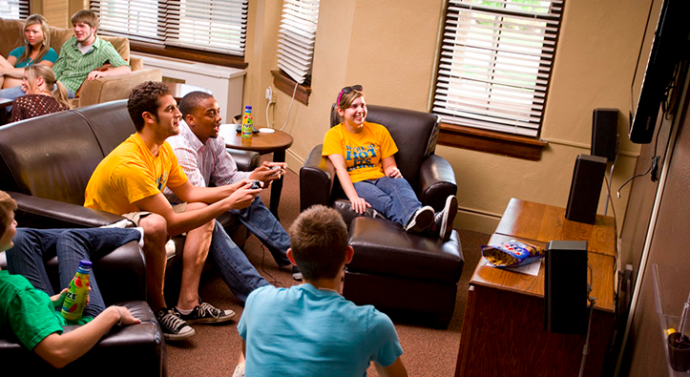
Director of Housing advises on student options for the upcoming year
Campus News February 16, 2018, Comments Off 144On February 2, 2018, housing information was emailed out to students. There are many options for on-campus housing such as apartment-style living, themed housing, Summit Leadership Community housing, fraternity housing and dormitory living.

Holly Binder, Director of Housing photo via Drury University
Themed Housing
Holly Binder, Director of Housing, said that “most students love their freshman living-learning communities, so I like to offer something similar for upperclassmen. Academic-theme houses for next year include Humanities, Honors, Social Justice, Art, and Foreign Languages. Each house has their own learning objectives and activities. The theme houses provide more privacy and amenities than freshman LLCs—each student has a private bedroom, and the houses have laundry machines and a dishwasher. Students can deepen their relationship with the faculty advisor(s), who teaches in that major/minor. Most of the theme communities have enough structure that students can earn engaged learning credit for graduation.”
Summit Park Leadership Community
In Summit Park students have the option to engage in a community service project connected to their housing option. In Summit Park, students partner with a local non-profit organization for the academic year. This current year, the houses partnered with the Springfield Watershed, the Dickerson Park Zoo, Boyd Elementary, and Champion Athletes of the Ozarks.
Sophomore Jake Decker talks about his experience living in Summit Park for the 2017-2018 academic year. “We are doing a community service project with Champion Athletes of the Ozarks which is a group of people with disabilities who come out to do sports such as basketball or bowling. Working with them has opened up a whole new view to me, especially with the ones I’ve worked closely with.”
Other Housing Options
Themed housing is not for everyone, so there are other options. There is apartment style housing in College Park and Jefferson Park as well as University Suites and Manley Hall. For those who are not interested in apartment living, there are dormitory rooms and campus houses along Benton Avenue.
Advice for students
The first step in choosing housing is figuring out where to live, whether it is themed housing tied to academics, community service based living, or non-themed apartment or dormitory living.
Binder advises, “If students don’t want their housing and academics tied together, then the most important thing to consider is who you want to live with! Make sure the people you sign up with have similar sleeping habits & concepts of cleanliness in the kitchen. Do you and your roommates agree on the frequency of guest visits? What about alcohol use? Are you comfortable enough with each other to express discomfort or frustration? Even the fanciest, most modern housing on campus won’t feel like home if you dread being there! Once you decide who to live with, consider the amenities you prefer & the budget you’re working with. All campus apartments offer private bedrooms, but we have a wide range of amenities to be weighed against each other—furnished vs. unfurnished, private parking vs. street parking, in-unit laundry machines vs. laundry hook-ups vs. community laundry, private bathrooms vs. shared bathrooms, dishwashers, balconies vs. patios vs. no outdoor space, proximity to Drury Lane, etc.”
On-campus living versus commuting
Some students prefer to commute to school. There are pros and cons to both living on and off campus. Binder talks about the benefits of both.
“Studies show that students who live on campus tend to have higher GPAs and are more likely to persist to graduation, and that is the case at Drury nearly every semester.”
“There’s something about hanging out in your ‘PJs’ late at night; the intimacy makes it easier to learn about other’s cultures and share your values with strangers. Additionally, conflicts are bound to arise when you have roommates or bathmates. As much as people don’t enjoy conflict, navigating it teaches us to assert ourselves tactfully and accept criticism with grace. Those are soft skills we all need for our professional lives!”
“For social butterflies who struggle with time management, leaving campus after class may help them focus on academics. Commuters can probably save about $1,000 – $1,500 a year living off campus, especially if they are willing to go bare-bones with amenities and be mindful of the thermostat.”
For more information about housing, visit Holly Binder in FSC 120 or contact by email at housing@drury.edu.
Article written by Keagan Merritt